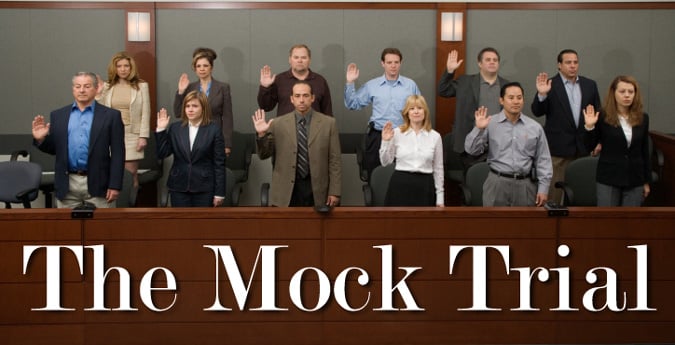by Elise Jefferson, M.A.
A2L Consulting
One might think it would be easy to run an experiment that could definitively conclude that mock trials are effective at predicting the outcome of a trial. If one could, it would solidify the value of mock trials in the eyes of litigators and consultants, and it would make mock trials a nearly mandatory part of the trial preparation process.
However, like many areas of trial preparation, mock jury trials are complex and involve an almost infinite number of variables. Because of this, it can be difficult to isolate a single dependent variable for study, while controlling for all of the other factors that may affect an experimenter’s ability to conclude that there is a causal link between the variable that was manipulated and the outcome of the trial.
Therefore, the question remains as to whether or not mock trials are at all effective. After all, if there cannot be a direct causal link drawn between a variable and the outcome, then how can one say that mock trials are worthwhile?
Historically, instead of attempting to address the overall question of the effectiveness of mock trial simulations, psychologists have focused their study of mock trials on what information can be gleaned from the mock trial process. Studies of the process have illuminated the many valuable aspects of mock trial simulations.
The strength of the evidence presented in a trial has been shown to be one of the highest predictors of jury outcomes. Studies have found, not surprisingly, a positive correlation between evidence strength and liability or determinations of guilt (Devine et. al., 2001; Winter & Robicheaux). As such, it is prudent for attorneys to use the mock trial process to evaluate how a jury or judge receives their evidence, in comparison to the opposing side’s evidence. In psychological research, the definition of “strength of the evidence” varies based on the study, with some studies using the quantity of evidence as the independent variable and others using the quality of evidence (Devine et. al., 2001; Winter & Robicheaux).
A study conducted by Taylor and Hosch (2004) found that the strength of prosecutorial evidence in criminal cases was strongly correlated to the defendant’s likelihood of facing conviction. This finding can be applied to civil trials, because when a jury is determining whether the preponderance of evidence requirement has been met, they will consider the quantity of evidence in order to come to their conclusion. Therefore, litigators can reliably use mock trial simulations to determine whether or not their evidence is strong enough to warrant going to trial in civil cases.
As mentioned in several articles on the A2L website, mock trials can assist in the fine-tuning of story formatting and presentation. There are multiple theories surrounding juror decision making, including both mathematical and explanation-based approaches. The most relevant explanation-based approach focuses on the use of a story model to explain the facts of a case to jurors. The story model states that jurors typically assimilate trial evidence into a story format (Winter & Robicheaux). As such, attorney presentation style should be geared toward making it easier for jurors to put the evidence into the story format. Litigators can test the effectiveness of various story formats through the use of a mock trial simulation. A study conducted by Pennington and Hastie (1988) found that jurors were more prone to decide in favor of the side that used a story format, as opposed to requiring jurors to construct their own story from those told by witnesses presented in a random fashion. Therefore, it is important for attorneys to consider what story best fits the evidence they will be presenting. Mock trials can be used to determine which story jurors are more likely to believe and determine how that story lines up with their knowledge of how the world works. A2L offers a storytelling webinar and an e-book focusing on storytelling in litigation.
The ability to definitively label mock trial simulations as completely accurate in predicting trial outcomes would require extensive research and controlled experimentation. Until such research is undertaken, studies show that mock trials can be extremely helpful in helping attorneys develop a strong case. These simulations can be especially effective in determining the strength of the evidence and selecting the appropriate story format.
Other useful articles related to mock trials, jury consulting and litigation consulting on A2L Consulting's site:
- A2L Voted Best Jury Consultants and Best Trial Graphics Firm by the Readers of LegalTimes
- 11 Problems with Mock Trials and How to Avoid Them
- 10 Suggestions for Conducting Mock Bench Trial Consulting Exercises
- The 14 Most Preventable Trial Preparation Mistakes
- 7 Questions You Must Ask Your Mock Jury About Litigation Graphics
- 11 Surprising Areas Where We Are Using Mock Exercises and Testing
- 10 Things Every Mock Jury Ever Has Said
- 12 Astute Tips for Meaningful Mock Trials
- Introducing a New Litigation Consulting Service: the Micro-Mock™
- 6 Good Reasons to Conduct a Mock Trial
- Trending: Mock Trial Testing of Litigation Graphics AND Arguments
- Why Do I Need A Mock Trial If There Is No Real Voir Dire?







Leave a Comment